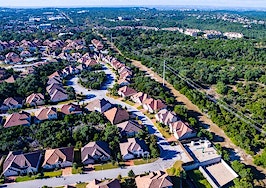When it comes to housing, make no mistake. Language is legally binding (or incriminating), so a thing has to be called a thing. There is no room for ironic humor or hyperbole in our language as real estate pros. Thus, I want to define an important term that has gained notoriety over the past several months — one that you may have heard without really understanding it.
What does it mean to be an anti-racist real estate pro?
I received what I believe to have been a genuine question from an agent who has been an email subscriber to my content for a few years:
“…how to be an Anti Racist Real Estate Pro… does that mean you are coming from experience as a racist or what? I missed something…” Charles S., Florida Realtor.
Although “anti-racist” is not a new term, it has not been widely used in mainstream media until recently, so I appreciate this question. Here’s the current dictionary definition of anti-racist: opposing racism and promoting racial tolerance. First known use of “anti-racist”? 1943.
Thus, to be clear, when I say, “how to be an anti-racist real estate pro,” please take that to mean: How to oppose racism and promote racial tolerance as a real estate professional. In other words, we as real estate pros not only support fair housing — which we are mandated by law to do — but we are actively opposing anything that falls short of fair housing for those of any and all races.
As a more expansive definition, Race Forward adds:
“Anti-Racism is defined as the work of actively opposing racism by advocating for changes in political, economic, and social life. Anti-racism tends to be an individualized approach, and set up in opposition to individual racist behaviors and impacts.”
Famed author Ibram X. Kendi further clarifies:
“What’s the problem with being ‘not racist?’ It is a claim that signifies neutrality: ‘I am not a racist, but neither am I aggressively against racism.’”
Here are examples to explain the difference even more so for and as real estate pros:



With the third example, you may have heard of the various instances (like this, this, this and this) of Black, Indigenous and people of color (BIPOC) homesellers getting higher appraisals when they push back or cover their identity with a white family member, friend or even stranger. (Yes, the random photos in a newly purchased picture frame can come in handy.)
On average, Black-owned housing is undervalued by $46,000. Yeesh!
To be clear, fair appraisals ensure the fair valuation of the overall community instead of unduly depressing values — remember the domino effect of the Great Recession? This is just one example of how anti-racism is not actually a zero-sum game that only helps BIPOC homeowners but helps all homeowners realize and have access to their home’s fair market value and equity.
Make no mistake: This is our opportunity to shine and even situate ourselves as not just trusted real estate experts, but with the higher designation of being anti-racist real estate pros.
This means we are committed to helping all real estate clients get equitable treatment, like getting a fair appraisal, which should be a straightforward guarantee of our industry.
More specifically, when I was on the sales side prior to training and coaching, I personally had to “go to bat” for my clients who received underestimated appraisal values.
I won out every single time because the comparable numbers spoke for themselves, and I was willing to get the Department of Housing and Urban Development (HUD) involved, though it never came to that. Now, as a trainer and coach, I help agents do the same.
Homesellers may not be aware of prejudices baked into the real estate industry, nor should they have to keep a running tally of what-if scenarios if we are doing anti-racist work as their expert agents.
Anti-racist work is our competitive advantage over disruptive technology (that, as quiet as it is kept, may contribute to racism). Anti-racist work is how we show clients our worth over an automated algorithm or an unconsciously biased human who may not attribute appropriate value. Anti-racism is our unique selling proposition.
Commensurate consequences vs. ‘cancel culture’
Let’s be clear. Opposing racism and promoting racial tolerance (aka being anti-racist) as a real estate pro is not a one-way street as some have alleged even saying that “anti-racist” is just code for “anti-white.”
As I mentioned in Real (Estate) Talk: Let’s cancel the word “discrimination,” the goal of being an anti-racist real estate pro is not for our white real estate friends to lose their businesses and/or become suicidal due to the infamous, damning nature of the current “cancel culture.”
Yes, we are absolutely requiring accountability with corresponding consequences (aka justice), but for those who want to do better once they know better, restorative, anti-racist education must be available too (which is the heartbeat of the workshops I lead and the programs I support on this topic).
Restorative, anti-racist education does not replicate harm and dehumanization through excessive isolation and dismissive practices — cancel culture does. Restorative, anti-racist education does not conflate canceling an individual with that person receiving fair or just consequences.
Rather, restorative, anti-racist education supports transformative change where those who have harmed others through the denial of fair housing receive commensurate consequences and actively participate in unlearning harm and learning inclusion. This is where authentic change begins:
“I am a newly licensed RE agent in Nassau county, Long Island. As a white agent, I grew up experiencing actual blockbusting in Canarsie, Brooklyn. In the past year I’ve read Stamped from the Beginning, The New Jim Crow, Caste, The Color of Law and am currently reading White Fragility. I wish to help redress this situation.” — Jeff N., Long Island agent.
Thus, eternal shame and banishment are not the crux of our work as anti-racist real estate pros — not if we want momentum and to garner ever-increasing support that galvanizes change agents. In sum, housing should be fair (it’s the law), called out when it is not, and those that violate fair housing should receive fair, commensurate consequences.
Shockingly, the National Association of Realtors (NAR) did not unequivocally nor overtly back this sentiment of restoration as opposed to cancellation. How so?
What if this happened to you?
Imagine your identifying information (name, video/image, etc.) and sales violations are published in your city’s local news. Yeesh! And then that — with your identifying information — goes viral across the nation. Yeesh!
Likely, such public naming and shaming would degrade your psychological safety, leaving you unnerved, demoralized and potentially depressed (perhaps to the point of suicidal thoughts).
Yet, psychological safety is necessary for authentic anti-racism work. I am sure you can see clearly that such drastic actions would not motivate you to enthusiastically and wholeheartedly be a willing anti-racist real estate pro in the least.
To be clear, the excessive public naming and shaming of individual agents (again, imagine your name plastered across local and perhaps even national news) does not inspire transformation but rather promotes a very personal loss to reputation, identity, and community. Such extreme humiliation is just not conducive to helping this industry as a whole do better by different people groups.
Isn’t creating an industrywide culture of proactive, anti-racist fair housing what we really want rather than simply a culture of crippling shame? (Brené Brown’s ears should be ringing.)
“Americans have long been trained to see the deficiencies of people rather than policy.” — Ibram X. Kendi
Our advocacy group, NAR, should understand this concept and fight tooth and nail to make sure we are not canceled (publicly humiliated and eternally exiled) when we want to do better (accept fair consequences).
Shockingly, our collective advocate, NAR — the very organization that we rely on and pay dues to as our advocates — did not courageously stand for this sentiment. This is telling for all NAR members about the true boots-to-the-ground, in real-life and real-time advocacy NAR is (un)willing to do on our behalf when it comes to such matters. That should scare each of us because no one gets it right all the time.
Instead, NAR allowed its production partner, the Fair Housing Justice Center (which had a hand in the expose mentioned in Real (Estate) Talk: Let’s cancel the word ‘discrimination’ and did not like the “calling out to call in,” restorative, anti-racist stance), to literally cancel parts of a mini-documentary we were collaboratively creating to get the word out on fair housing.
To elaborate, the Fair Housing Justice Center was offended by critique of the publication process that was too heavy-handed in publicly (it was published in Newsday and had national traction) naming and shaming individual real estate agents. So, that imaginary scene I painted above was a reality for some fellow real estate pros.
Make no mistake: Real estate agents’ fair housing violations and malpractices absolutely needed to be discovered, stopped and corrected. Nevertheless, to watch those same nationally humiliated agents — of various races, so not anti-white — express dehumanizing ostracization as a result of such excessive public humiliation at their state’s senate hearing last year, I have to wonder how many of them had to fight off more than negative thoughts.
That cannot be the ideal endgame of fair housing. Yet, as a result of this critique of such excessive public naming and shaming of individual real estate agents (that demoralizes our industry), the original concept of the collective fair housing video project that we had already volunteered hours from our busy schedules in a pandemic to film was canceled.
If the word “petty” came to your mind after reading that last sentence regarding their swift offense to being critiqued, I would not blame you.
Nevertheless, their offense and subsequent reaction is less about the “reindeer games” and more about the broader implication that there is a current absence yet need for real estate pros to have space to be corrected and face consequences.
That’s along with space to unlearn and improve in our pursuit of fair housing without the damaging and excessive threat of our psychological safety, reputation, or sense of community being in jeopardy. Those are all things that ultimately stifle the essential willing participation in anti-racism work.
For the people in the back: The extreme public naming and shaming of individual agents should have been egregious to NAR. Demoralizing individual agents that alternatively need developing does not simply cancel people; it cancels momentum for willing anti-racist work that undergirds fair housing laws.
It is like saying, “Go directly to jail; do not pass go, do not collect $200” because you have no place in our anti-racist, fair housing community. Yet, there should be no monopoly in anti-racist, fair housing work. That’s counterproductive to the long game of fair housing and may even contribute to the brewing counter-revolution that wants to squash anti-racist fair housing altogether.
Conversely, we can, and should be, anti-racist without being anti-improvement, anti-growth, anti-community or anti-agent. There are enough forces outside of and attempting to infringe upon our profession that are anti-us that we do not need that from one another.
Nor do we need neutrality from each other (hence why I’m not staying quiet). We need a proactive community to take a stand to promote anti-racist fair housing along with the psychological safety anti-racist fair housing work demands.
The marathon continues
“Those who build walls are their own prisoners. I’m going to go fulfill my proper function in the social organism. I’m going to go unbuild walls. We don’t have to engage in grand, heroic actions to participate in the process of change. Small acts, when multiplied by millions of people, can transform the world.” — Ursula K. Le Guin, The Dispossessed.
“May we always seek to build community. Let us walk humbly in grace and love as we walk beside one another.” — Sojourners’ Verse and Voice.
Despite the fallout, I continue to stand (no retractions here) for restorative, anti-racist education that:
- “Calls out” counterproductive policies, actions and systems along with the institutions that harbor them.
- “Calls in” individual real estate pros with fair consequences to educate instead of canceling them (which again demoralizes).
- Supports industry growth, enthusiasm, momentum and improvement surrounding fair housing rather than cancellation and discouragement.
Most importantly, if we cannot critique organizations that have the potential to wield policy and other impactful actions like they are weapons against individuals, then we are bound to repeat the atrocities of history.
Yes, NAR can be applauded for NAR Spire, Fairhaven, the ACT plan and other initiatives including having a needed “fair housing evangelist” (Bryan Greene, NAR’s Director of Fair Housing Policy) and the better-late-than-never apology (52 years after the Fair Housing Act).
Nonetheless, because this is a journey and not a set destination. We don’t “arrive.” We can, and frankly must, call out ineffective actions and the institutions that allow them — including our own — especially if they replicate harm.
For example, NAR’s promotion of the AARP Livability Index may (likely unintentionally) prove in the long run to perpetuate community inequities, further community decline and rail against diversity.
This is due in part to lower appraisal values (which impact housing owned by people of color disproportionately) influencing public school funding (that shapes school resources and “good” ratings), healthcare access, food security/apartheid and so much more of the criteria that determine this index’s “livability” scoring.
The ultimate aim of being an anti-racist real estate pro is everybody versus racism — not retaliatory, excessive punishment that furthers racial estrangement — to ensure fair housing is emphatically realized by all.
Accordingly, even if we have to walk this journey, which is more like a marathon and not a sprint, of being anti-racist real estate pros without the full, unwavering backing of NAR, then so be it.
This anti-racist journey is not unconditional agreement and allegiance — groupthink — to fallible organizations (especially those that historically and notoriously have upheld harmful housing practices) without space or opportunity for critique and improvement that uplifts our communities.
So let’s review: It’s everybody vs. racism
As research supports, “when people perceive one another as members of the same in-group, racial bias — and possibly other forms of bias against groups of people — tends to melt away.”
Fittingly, our in-group as real estate professionals can be based on our commitment to being anti-racists real estate pros, which is not predicated on having gotten everything right to date but rather is dedicated to improving and staying in community on this anti-racist journey.
My hope is that you will join in being an anti-racist real estate pro through intentional and ongoing opposition to and education about racism so that fair housing is truly realized by all.
To help you along your journey, join The Redress Project: The New Movement to Redress Racial Segregation led by Richard Rothstein (author of The Color of Law).
Want a 2021 primer into race and real estate in the U.S.? Download today your complimentary copy of my new book, How to Be an Anti-Racist Real Estate Pro.
Lee Davenport is a licensed real estate broker, trainer and coach. Follow her on YouTube, or visit her website.








